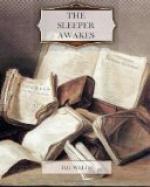And then it rose.
For a moment it looked as if it could not possibly clear the opposite cliff, and then that it could not possibly clear the wind-wheel that rotated beyond.
And behold! it was clear and soaring, still heeling sideways, upward, upward into the wind-swept sky.
The suspense of the moment gave place to a fury of exasperation as the swarming people realised that Ostrog had escaped them. With belated activity they renewed their fire, until the rattling wove into a roar, until the whole area became dim and blue and the air pungent with the thin smoke of their weapons.
Too late! The flying machine dwindled smaller and smaller, and curved about and swept gracefully downward to the flying stage from which it had so lately risen. Ostrog had escaped.
For a while a confused babblement arose from the ruins, and then the universal attention came back to Graham, perched high among the scaffolding. He saw the faces of the people turned towards him, heard their shouts at his rescue. From the throat of the ways came the song of the revolt spreading like a breeze across that swaying sea of men.
The little group of men about him shouted congratulations on his escape. The man in yellow was close to him, with a set face and shining eyes. And the song was rising, louder and louder; tramp, tramp, tramp, tramp.
Slowly the realisation came of the full meaning of these things to him, the perception of the swift change in his position. Ostrog, who had stood beside him whenever he had faced that shouting multitude before, was beyond there—the antagonist. There was no one to rule for him any longer. Even the people about him, the leaders and organisers of the multitude, looked to see what he would do, looked to him to act, awaited his orders. He was king indeed. His puppet reign was at an end.
He was very intent to do the thing that was expected of him. His nerves and muscles were quivering, his mind was perhaps a little confused, but he felt neither fear nor anger. His hand that had been trodden upon throbbed and was hot. He was a little nervous about his bearing. He knew he was not afraid, but he was anxious not to seem afraid. In his former life he had often been more excited in playing games of skill. He was desirous of immediate action, he knew he must not think too much in detail of the huge complexity of the struggle about him lest be should be paralysed by the sense of its intricacy.
Over there those square blue shapes, the flying stages, meant Ostrog; against Ostrog, who was so clear and definite and decisive, he who was so vague and undecided, was fighting for the whole future of the world.
CHAPTER XXIII
GRAHAM SPEAKS HIS WORD




